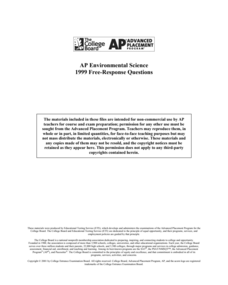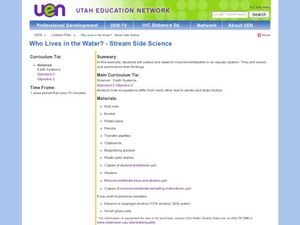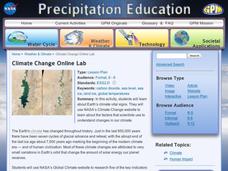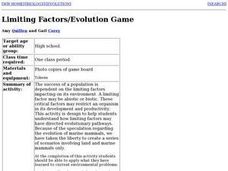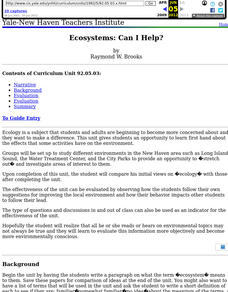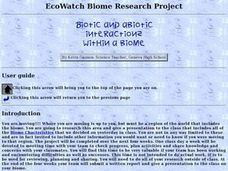National Park Service
Living & Non-Living Interactions
What better way to learn about ecosystems than by getting outside and observing them first hand? Accompanying a field trip to a local park or outdoor space, this series of collaborative activities engages children in learning about the...
NOAA
Build Your Own Ocean Ecosystem
Hold the sea in the palm of your hand! Amateur oceanographers work together to create models of an ocean ecosystem in the sixth and final installment in a series. Raise awareness of global ocean health issues through guided research,...
College Board
1999 AP® Environmental Science Free-Response Questions
Pollution is a real concern in most areas of Earth. A four-question AP® assessment has learners analyze data related to water pollution and air pollution as well as consider the pros and cons of recycling. Each question has several...
Curated OER
Regents High School Exam: Living Environment 2008
Tne New York Regents High School Examinations are comprehensive and include various styles of questions, includingmultiple choice and the analysis of graphs. This particular version, the 2008 Living Environment exam surveys a variety of...
Curated OER
Regents High School Examination: Living Environment 2005
The 2005 version of the Regents High School Examination in the area of ecology is as comprehensive as previous years' exams. It consists of 40 multiple choice questions on everything from the structure of DNA to the interactions within...
Curated OER
Regents High School Examination: Living Environment 2003
The living environment, from the interior of a cell to the complex relationships among populations, are queried in this final examination. Learners look at air pollution maps, diagrams of cells, population graphs, and drawing of cells....
Curated OER
Who Lives in the Water? Stream Side Science
Andree Walker thought of everything when he wrote this resource. It includes a detailed list of materials and background information links for the teacher. In addition, it has procedures, a macroinvertebrate identification key, and tally...
NASA
Climate Change Online Lab
What are the key indicators that show scientists that our planet is in the fastest warming trend ever? Learners go on a WebQuest to examine the evidence for themselves. Following several links to NASA sites, kids see how the global...
Curated OER
Bahamian Terrariums
Sixth graders create a Bahamian terrarium. In this Bahamian ecosystem lesson, 6th graders watch a PowerPoint to see Bahamian biotic and abiotic factors. They bring in 2-3 items for their terrarium.
Curated OER
Communities and Biomes
In this communities worksheet, high schoolers will look at the interactions between biotic and abiotic factors and the effect these factors have on organism populations. Students will also order the succession steps that occur over time...
Curated OER
Living and Nonliving Environments
In this ecosystem worksheet, students will distinguish between the abiotic factors and biotic factors shown in a diagram. Then students will correctly order the following: population, ecosystem, community, and organism.
Curated OER
Flowering Phenology: How Do Plants Know When To Flower?
Students explore the biotic and abiotic factors that affect plant reproduction and the potential consequences of human activities on plant populations. The effects of urbanization are discussed as an influence in the consequences.
Curated OER
Pond Water Survey
Students identify and describe various organisms living in a pond water environment. They describe the characteristics of living things. Students compare and contrast organisms created by asexual reproduction and sexual reproduction....
Curated OER
Species Interactions in the Yucatan Peninsula
Sixth graders explore how organisms interact with one another other in their environment. In this organism lesson, 6th graders understand abiotic factors and or biotic components of their environment. Students decide if the interactions...
Curated OER
Biodiversity and Ecosystems
Middle schoolers differentiate between biotic and abiotic factors in this science lesson plan. Learners collect data for the experiment and analyze the data after graphing it using the CBL 2. This experiment is split into two different...
Curated OER
Succession in a Jar
In this succession worksheet, students build an ecosystem using a jar, water, bird seed, soil and a water plant. They predict what their ecosystem will look like in 3 weeks and draw a diagram. Students record their data over the course...
Curated OER
Designing a Real Life Ecosystem!
Students research abiotic and biotic factors concerning the concept of an ecosystem. Record and analyze data collected. Write a lab report in proper and scientific format with thinking and analytical skills. Work as a cooperative team.
Curated OER
What Is Natural?
Your junior highers will learn about which objects are natural and classify objects as abiotic or biotic. Your class will trace human products to their natural resources using matter cycles and then create their own definition of nature.
Curated OER
Plants and Ecosystems
The relationships within and between ecosystems can be explored. after examining an area for living and non-living things students complete the same examination in the forest ecosystem. Students identify abiotic and biotic elements in an...
Curated OER
Limiting Factors/Evolution Game
High schoolers play a board game with provided cards which help them realize that limiting factors may restrict an organism in its development and productivity and direct evolutionary pathways.
Curated OER
Ecology: Factors Influencing Animal Populations
Students assess the factors affecting animal populations. Working in groups they define specific vocabulary terms and complete several activities from "Project Wild."
Curated OER
Ecosystems: Can I Help?
Students study how some activities effect the environment and ecosystems.
Scholastic
Study Jams! Ecosystems
With the forest as an example, Sam and Zoe talk about the components biotic and abiotic of an ecosystem. They also discuss the role of producers, consumers, and decomposers. This concise clip covers all of the basics. As an introduction...
Curated OER
Biotic and Abiotic Interactions Within a Biome
High schoolers work together to examine the characteristics of a biome. Using the Internet, they research the relationship between biotic and abiotic factors and living organisms. They develop a presentation along with a solution to a...
Other popular searches
- Biotic Abiotic
- Biotic and Abiotic Factors
- Biotic and Abiotic
- Abiotic Biotic Environment
- Abiotic and Biotic Elements
- Abiotic and Biotic Resources
- Biotic Abiotic Factors
- Abiotic Biotic Lab
- Ecosystems Abiotic Biotic
- Biotic Abiotic Pictures
- Biotic Abiotic Piotures
- Biotic or Abiotic Changes




